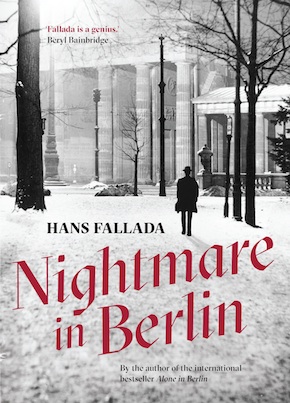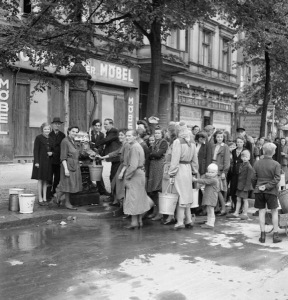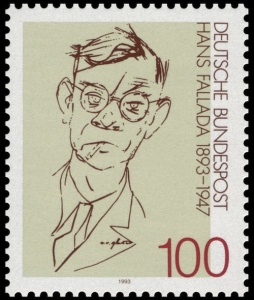Wraiths of neither good nor evil
by Mika Provata-Carlone
“Unfalteringly honest and often terrifying.” Observer
With the hindsight of history, with the raw, stinging feeling on the skin of one’s conscience of the viciousness and harrowing desolation that was spawned by Nazi rule and WWII, it may seem that there was for Germany a distinct separation between a brutal, all-obliterating moment of total guilt and a redeeming ‘moment after’ of atonement, reconstruction, perseverance and reparation. That is the blind spot of our objectivity – and of our ever-hopeful humanity.
Before there was even a question of either culpability or remorse, sin or forgiveness, there was a howling time of non-entity, a vacant psychological, moral, historical space inhabited by wraiths of neither good nor evil: a post-apocalyptic horror zone when everything is in limbo, when narratives are threadbare, when vision is detached, consciousness is dissolving and existence is materially and metaphorically fading. After the bombings of its major cities, the collapse of all its military fronts and the admission of total defeat, before the process of meting out justice and of reconstruction had been embarked upon by the Allies, this is the state of the no longer extant German Reich.
Few stories – told or written – have endeavoured to capture the voice (the Munch-like scream) of that moment. Wilful amnesia and determined or unconscious denial blocked a more guttural but also more disturbingly truthful response to a past that now had to evolve or at best dissolve into a future. In that respect, Hans Fallada’s Nightmare in Berlin is a unique writerly gesture and historical document. On its pages what develops is not so much a story as a chronicle of both restlessness and paralysis, of blindness and demonic vision, of incipient causes and of inescapable aftermaths. Like Schlegel’s historian, Fallada’s characters are prophets facing backwards.
Fallada was conscious of the annalistic nature of his novel, deciding to publish it, for all the failings he himself perceived in it, “so that it may perhaps be of some value as a document humain, a faithful and true account… of what ordinary Germans felt, suffered and did between April 1945 and the summer of that year.” He intended to record the “feeling of utterly helpless shame” which was “the malady of the age, [that] mixture of bottomless despair and apathy.” In the process, he offers us an unalloyed character analysis of such “ordinary Germans”, the celebrated Volk, and a terrible insight into the ostensible purity and claimed innocence of that ethnological and racial figment for whose sake so many millions had to die and so much that was good was twisted and perverted perhaps beyond repair.
Fallada conjures up tableau after tableau of the historical and the mundane… Survival takes infinite forms of the same thing: reinvention, dissociation, sublimation, pretending nothing happened.”
Fallada picks two unexceptional characters, a writer and his second wife, as his foils not only for Germans as a people caught at the brink of a historical precipice, but also for the human psyche at its most deconstructed state, what the Romans diagnosed as existential, moral sloth or acedia. We are both drawn to and repelled by Mr and Mrs Doll as they negotiate first the advance of the Red Army on a German village, and then life in Berlin, now razed to the ground and teeming with refugees, permanent residents and every kind of human flotsam and jetsam – as well as prospering professionals and businessmen picking up just where they had left off. At the very beginning of the novel, Mrs Doll, on her way to the chemist for essential ‘medicinal’ narcotics, jarringly dispels the rumours of the Soviet threat propagated by the Nazis by enlisting the help of one of these invaders: “Listen, Vanya, open up the shop for me, will you?” she unflappably demands, and ‘Vanya’ complies gallantly, mutely, disconcertingly.
The chemist will commit suicide after dispensing the ‘prescription’, children are running amok in the village streets, getting drunk on stashed-away liquor, and Mrs Doll will intervene to restore order and civilisation. Another ‘Vanya’ will bandage her arm when she cuts herself with a shard of glass. Mr Doll will become the town mayor while the Soviets are stationed there, until he loses his post and must return to Berlin to reclaim a requisitioned apartment, an abandoned writer’s life, a place in a society that balances itself delusionally and precariously on the sharp edge between a hallucinatory normality and a stark, hellish abyss.
 Fallada conjures up tableau after tableau of the historical and the mundane. Germany is exposed as a “creature with many hundreds of heads… just holding its breath… driven mad with fear for what lay ahead, mad with hope that this horrendous war was finally coming to an end.” Survival takes infinite forms of the same thing: reinvention, dissociation, sublimation, pretending nothing happened, securing a place outside history in order to remain unscathed from both memory and material consequences.
Fallada conjures up tableau after tableau of the historical and the mundane. Germany is exposed as a “creature with many hundreds of heads… just holding its breath… driven mad with fear for what lay ahead, mad with hope that this horrendous war was finally coming to an end.” Survival takes infinite forms of the same thing: reinvention, dissociation, sublimation, pretending nothing happened, securing a place outside history in order to remain unscathed from both memory and material consequences.
The world of Nightmare in Berlin is a world suspended, almost non-existent, a world that fuses drug-induced analgesic dreaming with disconnected floating over a reality that overwhelmingly reasserts itself. The absurd becomes logical and logic skews its own vision to avoid seeing, witnessing, above all being caught within the range of another’s glance: “all [of Doll’s] long-cherished hopes for the post-war future lay in ruins, crushed under the withering gaze of the three Russian soldiers. He was a German and so belonged to the most hated and despised nation on earth, a nation lower than the most primitive tribe of the African interior, which could never visit so much destruction, bloodshed, tears and misery on the planet as the German people had done.”
The tension between questioning and resignation (or indifference) is at the crux of Fallada’s story, as is the total dismissal of any theory of partial guilt, of exceptionalism, of differentiation between those who lived in Germany unresisting during its Nazi years. The very possibility of atonement is almost inconceivable, while the confrontation with the revelations of the nature and extent of Nazi crimes is relentless and explicit: the gut reaction to plead ignorance and therefore innocence, is subverted instantly by the acknowledgment that everyone “saw it coming with the persecution of the Jews” and the harrowing admission that “had I known then what I know today about all those horrors, I probably still wouldn’t have done anything – beyond feeling this powerless hatred.”
The uniqueness, one might call it the spine-chilling charm of this novel, is the way Fallada conveys every heartbeat, nerve shock or comatose symptom of those few months in 1945 (but also of all the years that had led to them and certainly of several that were to follow). Combining the angularity and harsh visual effects of New Objectivity with the ostensible childlike quality of a naïf painting, he confronts us with the myth of Aryan innocence, with a Guerre des Boutons or Lord of the Flies-like still surface, underneath which hideous, primeval violence still remains untamed and unaccounted for. He gives us unedited snapshots of the defeated Germans as self-defined castaways, guiltless of the wreck, detached from the ship or its crew, demands that we process the fact and the numerical reality of suicides at the end of the war (and their contrast to Jewish suicides at the beginning of the Nazi era), of addictions to drugs or alcohol, through consecutive flashbacks exposing empty shells of lives, even before the war had ended. Pettiness, backstabbing, small-mindedness, guttural cruelty and nastiness are what is left behind once the “Nazi bigwigs” have “all fled to the Western zone.”
We feel the immense weight of the task faced by the ‘dark and menacing multitude’ to work to clear up the war rubble, rebuild, repair, while they starve and die.”
Fallada provides not only a relentlessly candid relief of Germany at the tipping point between war and peace, but a brutally honest analysis of the success and rapid ascent of Nazism, of the fertile, eager ground that ideology, and especially its material promises, found in a nation where needs and greed were placed above the dignity of human society. Yet his gift, his extraordinary talent, is that he does so with irresistible humour, a perhaps guilty humility, an indomitable faith that some restoration, analysis, prevention will be possible, for all the palpable sense of denial, resentment, fragmentation, dehumanisation. There is sad amusement in the tribulations and petulant peregrinations of Mr and Mrs Doll around dilapidated dispensaries, clinics, private doctors so that they may procure the wherewithal for that vital “Little Death” to counter “his big brother, ‘Big Death’, the last remaining hope”, unmistakable comic relief in their efforts to dislodge, outsmart, fend off the two lodgers, one fiendishly cunning and old, one seductively resilient and young, who have taken over their apartment, their possessions – almost literally their lives. Dreams of a new life, of literary grandeur, salons and publishing success become clues to a precious code of merciless irony. We sympathise with and deplore in equal measure the very stark realism of this self-indulgence in escapism and dissociation, feel the immense weight of the task faced by the “dark and menacing multitude” that is the “entire German people”: to work to clear up the war rubble, rebuild, repair, while they starve and die, return to total devastation from the front and the Eastern provinces. The heavy conscience that paralyses is juxtaposed, bluntly but also humanely, with the ineluctability of guilt and the vital need of survival.
 Before we look forward, Fallada seems to say, we must look back. And after WWII, it was not merely the atrocity of Nazi crimes that was shockingly exposed. What was even more shocking was how Germans now felt themselves exposed – as knowing observers, silent bystanders or infinitely worse. In this Brechtian docu-fiction, with its vaudeville darkness, history, Fallada insists, cannot happen elsewhere. Doll has to read piles of old newspapers to understand what has happened in the months since the world ended, a cynical reminder of how both good and evil are never hidden but always there. “Evil continued to triumph as it had for the previous twelve years… he often had the feeling that deprivation and hardship were simply turning them into better Nazis than they were before… To all of them… the years of the Hitler tyranny suddenly seemed like some sort of golden age.” The awfulness of these realisations will place a terrible accent of death on Doll, and eventually on Fallada himself, since they expose the truth behind the fatality that was almost dictated by the Nazi regime: reconstruction or atonement without history is only an all-devouring errantry in an insubstantial present.
Before we look forward, Fallada seems to say, we must look back. And after WWII, it was not merely the atrocity of Nazi crimes that was shockingly exposed. What was even more shocking was how Germans now felt themselves exposed – as knowing observers, silent bystanders or infinitely worse. In this Brechtian docu-fiction, with its vaudeville darkness, history, Fallada insists, cannot happen elsewhere. Doll has to read piles of old newspapers to understand what has happened in the months since the world ended, a cynical reminder of how both good and evil are never hidden but always there. “Evil continued to triumph as it had for the previous twelve years… he often had the feeling that deprivation and hardship were simply turning them into better Nazis than they were before… To all of them… the years of the Hitler tyranny suddenly seemed like some sort of golden age.” The awfulness of these realisations will place a terrible accent of death on Doll, and eventually on Fallada himself, since they expose the truth behind the fatality that was almost dictated by the Nazi regime: reconstruction or atonement without history is only an all-devouring errantry in an insubstantial present.
Nightmare in Berlin is a moving, unsettling, often shocking chronicle of the effort to hope in a quagmire of personal traumas, historical outrage, inescapable moral guilt and accountability for horrors impossible to contain in a conscience of any size, or to atone for. Scribe has produced a book that must not go unnoticed, and it has done so with fine flare for what will aesthetically underscore what the pages contain, bridging narrative and real temporality. Remove the dust jacket and you will have a moment of double vision: a book that could have been taken off the shelves of a 1945 Berlin bookshop untouched by time. Equally untouched is the immediacy of the moment of crisis, of judgement, the plea for a much different humanity – so very critical today, as it was then.
 Hans Fallada (1893–1947) was the pen name of Rudolf Ditzen, whose books were international bestsellers on a par with those of his countrymen Thomas Mann and Hermann Hesse. He opted to stay in Germany when the Nazis came to power, and eventually had a nervous breakdown when he was put under pressure to write anti-Semitic books. He was cast into a Nazi insane asylum, where he secretly wrote The Drinker (Putnam, 1952). Immediately after the war he wrote his last two novels, The Nightmare (a.k.a. Nightmare in Berlin) and Alone in Berlin, but died before either book could be published. Alone in Berlin, translated by Michael Hofmann, was published by Penguin Modern Classics in 2010. Nightmare in Berlin, translated by Allan Blunden, is now published by Scribe.
Hans Fallada (1893–1947) was the pen name of Rudolf Ditzen, whose books were international bestsellers on a par with those of his countrymen Thomas Mann and Hermann Hesse. He opted to stay in Germany when the Nazis came to power, and eventually had a nervous breakdown when he was put under pressure to write anti-Semitic books. He was cast into a Nazi insane asylum, where he secretly wrote The Drinker (Putnam, 1952). Immediately after the war he wrote his last two novels, The Nightmare (a.k.a. Nightmare in Berlin) and Alone in Berlin, but died before either book could be published. Alone in Berlin, translated by Michael Hofmann, was published by Penguin Modern Classics in 2010. Nightmare in Berlin, translated by Allan Blunden, is now published by Scribe.
Read more.
Allan Blunden’s translations include Erhard Eppler’s The Return of the State? which won the Schlegel-Tieck Prize, biographies of Heidegger and Stefan Zweig, and the prison diary of Hans Fallada.
Mika Provata-Carlone is an independent scholar, translator, editor and illustrator, and a contributing editor to Bookanista. She has a doctorate from Princeton University and lives and works in London.

